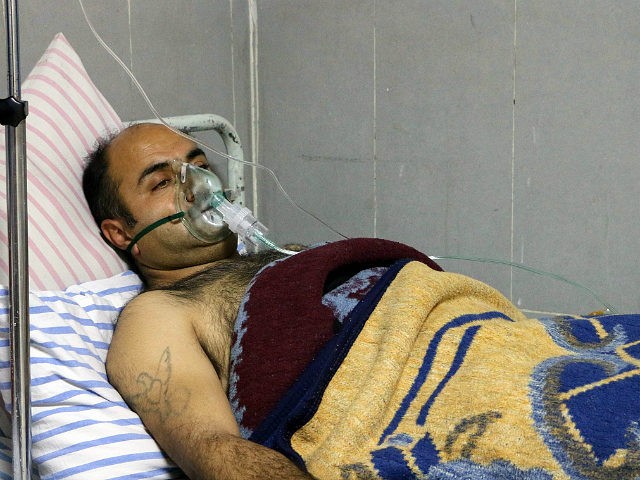Turkey’s foreign minister dismissed allegations the country used chemical weapons against the Kurds in northern Syria’s Afrin region as fake news disseminated by the terrorist Kurdistan Workers’ Party (PKK) organization, arguing that Turkey is taking the utmost precautions to avoid hurting noncombatants.
“It’s just a fabricated story. Turkey has never used any kind of chemical weapons,” Turkish Foreign Minister Mevlut Cavusoglu told reporters in Germany, reports Reuters.
“It is out of the question for Turkey to use an internationally prohibited war tool in Afrin,” Yasin Aktay, a chief adviser to Turkish President Recep Tayyip Erdogan, told Al Jazeera.
“These are baseless accusations. Turkey never used chemical weapons. We take utmost care [of] civilians in Operation Olive Branch,” an anonymous Turkish diplomatic source told Reuters, referring to the offensive against Kurdish-held Afrin in northern Syria launched by Turkey on January 20.
Afrin officials told Kurdistan 24 that Turkish airstrikes have killed 180 civilians, wounded another 143, and displaced about 60,000 since the Turkish-led conflict began on January 20.
Turkey claims it has killed “1,614 terrorists” and 32 soldiers since “Operation Olive Branch” began on January 20.
Medical officials at Afrin’s main hospital told Kurdistan 24 that a suspected chlorine gas attack on Friday injured six civilians in the Arenda village west of the self-declared canton near the border with Turkey.
“Doctors said the patients treated at the hospital were suffering from skin and lung irritation and were having difficulty breathing,” notes Kurdistan 24.
Reuters reports that Syrian Kurdish groups, a monitoring organization, and dictator Bashar al-Assad regime-friendly news outlet all claimed Ankara carried out a suspected gas attack that wounded people in Syria’s Afrin region on Friday.
Reuters identifies the monitor group accusing Russia of chemical attacks as the U.K.-based Syrian Observatory for Human Rights (SOHR), a group that monitors the Syrian conflict using various sources on the ground.
“Medical sources confirmed the use of gases during the shelling, but the SOHR was not able, until now, to know the type of the used gases,” the U.K.-based organization said in a statement.
“[S]ix people in the attack suffered breathing difficulties and dilated pupils, indicating a suspected gas attack,” the monitor group reportedly learned from the medical sources.
Birusk Hasaka, a spokesman for the Kurdish People’s Protection Units (YPG) fighters in Afrin, also told Reuters that the Kurds suffered a chemical attack at the hands of Turkish troops in Afrin.
“SANA, the official Syrian news agency, quoting local doctors, repeated the claim, and said that six people were hospitalized with symptoms of suffocation from Turkish projectiles carrying poisonous gas,” reports Al Jazeera.
Trump’s White House acknowledged the reports of the chemical weapons attacks in Afrin but stressed that it was unable to confirm Turkey as the culprit.
“We judge it is extremely unlikely that Turkish forces used chemical weapons,” a spokesman for U.S. President Donald Trump’s National Security Council reportedly said. “We continue to call for restraint and protection of civilians in Afrin.”
The Turkish foreign minister accused the terrorist communist PKK of disseminating false news about the so-called chemical attack.
FM Cavusoglu stressed that Turkey has been extra careful to avoid civilian casualties. He went on to accuse the YPG of using noncombatants as “human shields” in Kurdish-held Afrin.
On January 20, YPG responded to the Turkish offensive against Kurdish-held Afrin. The YPG leads and makes up the majority of the Syrian Democratic Forces (SDF), a U.S.-backed Kurdish-Arab alliance fighting against the Islamic State (ISIS/ISIL).
Turkey has long considered the YPG and their allies to be linked to the PKK group, which both Ankara and Washington consider terrorists.
Despite Turkey’s concerns about the YPG and PKK relationship, the United States continues to back the Syrian Kurds in their fight against ISIS.
U.S. support for Syrian Kurds has driven a wedge between Turkey and the United States.
Following the demise of ISIS, the Iranian-Russian-backed Assad regime appears to control more territory than any other player in Syria, including the U.S.-backed Kurds.
The Kurds and the Assad regime have reportedly reached a deal to join forces against Turkey, Reuters learned from Badran Jia Kurd, an adviser to the Kurdish-led administration in northern Syria.
Assad troops are no strangers to using chemical weapons. Turkey may soon be faced with a chemical attack against its own forces.
In the latest Worldwide Threat Assessment, the U.S. intelligence community has accused the Assad regime and ISIS of using chemical weapons, writing:
We assess that the Syrian government used the nerve agent sarin in an attack against the opposition in Khan Shaykhun on 4 April 2017, in what is probably the largest chemical weapons attack since August 2013 … Even after the attack on Khan Shaykhun, we have continued to observe allegations that the regime has used chemicals against the opposition.
“We assess that ISIS is also using chemicals as a means of warfare. The [UN] concluded that ISIS used sulfur mustard in two attacks in 2015 and 2016, and we assess that it has used chemical weapons in numerous other attacks in Iraq and Syria,” adds the assessment.

COMMENTS
Please let us know if you're having issues with commenting.